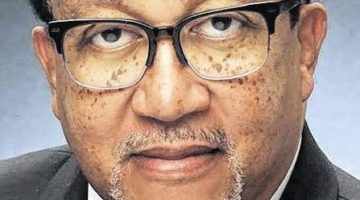Among all of President Donald Trump’s many character flaws, perhaps the most unfortunate one is a lack of empathy, especially for those who need it the most. But compassion is a necessary trait for any president, who, as head of state, often has to comfort and console Americans in times of crisis.
Take the case of Puerto Rico. As then tropical storm Dorian bore down on the island last Wednesday morning with a likelihood that it would become a hurricane, the president tweeted, “We are tracking closely tropical storm Dorian as it heads, as usual, to Puerto Rico. FEMA and all others are ready, and will do a great job,” referring to the Federal Emergency Management Agency. “When they do, let them know it, and give them a big Thank You – Not like last time. That includes from the incompetent Mayor of San Juan!” There were no words of support for the three million Puerto Ricans who could be in the path of the storm. There was no address to the nation as of this writing Saturday to express the president’s concern and to explain just how he was mobilizing national resources to meet the threat.
In a later tweet the same day, as Dorian was becoming a hurricane, Trump continued his verbal vendetta with some of its leaders: “Puerto Rico is one of the most corrupt places on earth. Their political system is broken and their politicians are either incompetent or Corrupt. Congress approved Billions of Dollars last time, more than anyplace else has ever gotten, and it is sent to Crooked Pols. No good! And by the way, I’m the best thing that’s ever happened to Puerto Rico!” He also tweeted: “Wow! Yet another storm heading for Puerto Rico. Will it ever end? Congress approved 92 Billion Dollars for Puerto Rico last year, an all-time record of its kind ‘anywhere’.” Trump was referring to Hurricane Maria which struck the island two years ago, killing nearly 3,000 Puerto Ricans – a number which Trump still disputes. He still had nothing to say about the tragedy. And the $92 billion was a figure which the White House came up with.
Congress appropriated $42.7 billion, of which the federal government was required to spend at least $20.8 billion. The amount actually spent was $13.8 billion.
In all of his comments on Puerto Rico, Trump has given the impression that he is talking about some alien impoverished nation which wants only to benefit from American largesse.
But, as he must know very well, Spain ceded the 4,320-square-mile island to the U.S.
on Dec. 10, 1898, under the Treaty of Paris. Puerto Rico is an American territory, its political status now just short of statehood and all its people are American citizens. That makes the president responsible for the safety of Puerto Rico and Puerto Ricans and obligated to do everything possible to help them in time of need.
Dorian did little damage to the island but that does not minimize the need for the aid for the Maria recovery, even though Trump has said the destruction then was not “a catastrophe like Katrina.” Of course, the federal government, under President George W. Bush, failed the people of New Orleans, 1,833 of whom drowned.
This much is common to both New Orleans and Puerto Rico: poverty and the problems it creates. Trump does not like such places, as he made clear when he used a derogatory word to describe Haiti and African countries.
This mean-spiritedness also undergirds his inhumane immigration policy which, most recently, saw him getting ready to divert $155 million from FEMA’s Disaster Relief Fund to help pay for his border wall.
This attitude, however, is not peculiar to Trump. Daniel Immerwahr noted in his book, “How to Hide an Empire,” that the former president of Columbia University and Nobel Laureate Nicholas Murray Butler opposed admitting Hawai’i and Alaska to the union because it would “mark the beginning of the end of the United States as we have known it.” Talking about Hawai’i, a Massachusetts newspaper remarked, ‘We do not want those people to help govern the country. When future issues arise in the United States, we do not want a situation where vital decisions may depend upon two half-breed senators.”
One writer said, “It is one thing to admit scattered communities of white, or nearly white, men into the rights of citizenship but quite a different matter to act in the same way with a closely packed and numerous brown people.” “Puerto Ricans,” Immerwahr remarked, “had a history of serving as subjects for experimental medical research, from anemia to mustard gas. Their poverty and marginal position in U.S. history made them all-too-convenient fodder.” That includes residents of the Puerto Rican island of Vieques, where, for more than 60 years, the U.S. Navy carried out military tests.
The Atlantic magazine asked in 2016 whether alarmingly high cases of illnesses such as heart disease and cancer are a legacy of those tests.
This is the Puerto Rico, a U.S. territory whose residents are American citizens, that the president has no qualms about denigrating in the most heartless terms. He did not call off his trip to Poland when Dorian was bearing down on the island but did so when the storm shifted to West Palm Beach. Cynics could see a link to the fact that Trump’s Mar-a-Lago resort is located nearby. That is the level to which public discourse has degenerated.












No Comment